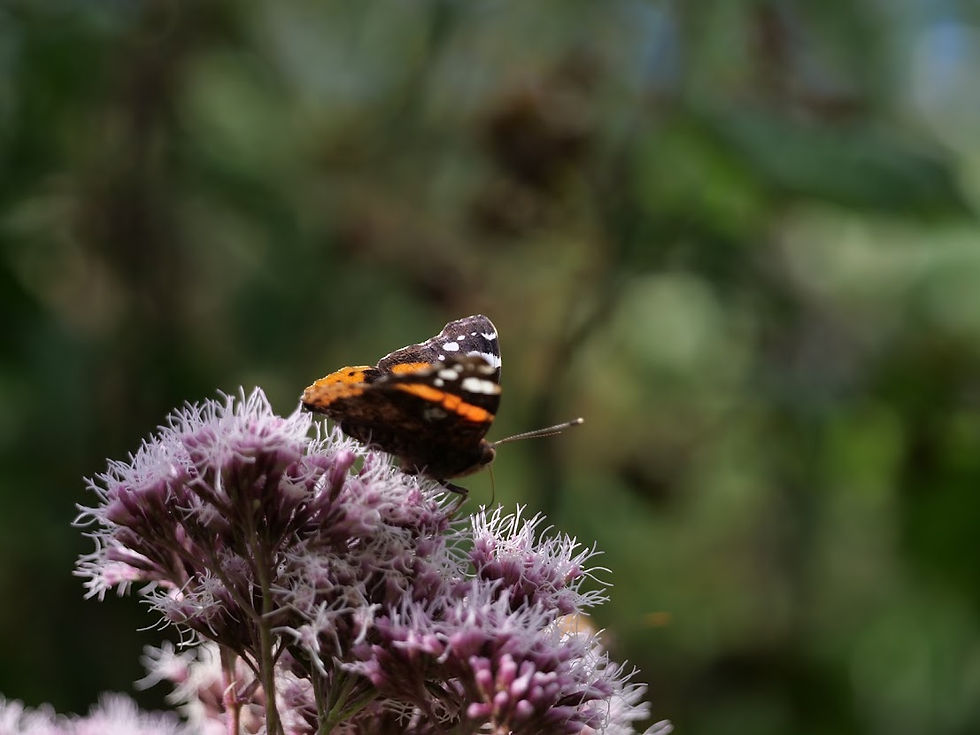Butterflies, Wild Flowers & Birds at the Steyning Downland Scheme 04.08.22
- Sim Elliott
- Aug 6, 2022
- 3 min read
On Thursday 04.08.22 I visited the wonderful Steyning Downland Scheme. It is very easy to get there by public transport. I got the 2 bus, from just outside my house in East Brighton, to the Steyning; see: 2 - Steyning-Rottingdean | Brighton & Hove Buses I got the 6.10 am bus - yes, 6.10 am bus, which arrived in Steyning at 7.09 (Steyning Clock Tower). Buses to Steyning go once every hour. Why this early? I was keen to find Brown Hairstreak Butterflies; for which the Steyning Downland Scheme is famous. I didn't see any; but I had a wonderful morning; getting the 12.35 back home. If you get off at Steyning Clock Tower, walk through the public car park, and exit into Charlton Street; turn right and walk along Charlton Street; just after Charlton street make a 90 degree turn left, where Charlton joins Mill Road (at 90 degree to the right), carry straight on up Allotment Lane (past Steyning Bowls Club on your left) until you reach the entrance to the Steyning Downland Scheme (riffle range) on your right. See here for a map: Maps | Steyning Downland Scheme
My previous posts on the Steyning Downland Scheme:
Steyning Downland Scheme: a Marsh Tit, a Dingy Skipper and a Grey Wagtail. 05.07.22 (simelliott.net)
In this post the photographs are presented in chronological, rather than species groups, to give an impression of my "nature journey" through the sight
All sections of text in italics are quotations, sources given at the end of the quote
The lane to the scheme
Some sheep, possibly Balwen Welsh Mountain, in the field below the Riffle Range

"The Riffle Range"

Meadow Brown on Creeping Thistle

Female Meadow Brown; one of many

Another female Meadow Brown - that has lost part of wing; probably from a predatory attack from a bird

A Gatekeeper; one of many

A Gatekeeper showing underwings

Another Gatekeeper

and another!

Speckled Wood (where the Riffle Range joins the woods)

Lower Horseshoe Walk

Creeping Thistle

Sliver Washer Fritillary on Hemp-agrimony


Meadow Brown on Hemp-Agrimony

Worn Meadow Brown

Fledgling Wren



Fallen tree and Ragwort

Sow Thistle

Woundwort, sans flowers

Sow Thistle

Great Willowherb

Fairy Foxglove

Leaf!

Leaves!

Meadow Brown on Greater Burdock; the little red dot is a mote: called trombidium breei. They do not seem to harm the butterfly. Some species of butterfly are more prone than others – ones that are often seen with red mites are Meadow Brown males; Marbled White; Common Blue and Small Skipper. Red mites | Dorset Butterflies

Comma and Silver washed Fritillary on Buddleia




Comma


Silver Washed Fritillary on Creeping Thistle


same individual on the ground

A different Silver Washed Fritillary

Another Comma

A Gatekeeper

Upper Horseshoe Path
View of the Horseshoe Woods


Red Admiral

enlarged and electronically lightened

Another Wall Brown - a good day for Wall Browns

Juvenile Yellowhammer being fed by a parent



The Meadow
Meadow Brown on Hemp-Agrimony

Gatekeeper with worn wings

Another Gatekeeper


Red Admiral with underwings showing; some Red Admirals hibernate with their wings closed; it is useful to look like a dead leaf when there are hungry birds around in winter

Speckle Wood (near the boundary with the wood)


A Wall Brown

Another Wall Brown

Common Blue

Clouded Yellow - a wonderful summer migrant from Europe/North Africa

Back in the Rifle Range
A slightly worn Common Blue

Another Gatekeeper - definitely the most common butterfly seen today; and on all my recent butterfly trips

Another Wall Brown

Common Blue

A male Meadow Brown

A Small Skipper; while it might be an Essex Skipper; but it is not possible to see the end of the antenna to differentiate it

Small Skipper is similar [to the Essex Skipper] but lacks black tips to the antenna (best-viewed head-on) and has longer scent brand, angled to the edge of the forewing.
Essex Skipper butterflies closely resemble and are often found in company with Small Skippers. Because of the similarities, the Essex Skipper has been overlooked both in terms of recording and ecological study, and it was the last British resident species to be described (in 1889). Essex Skipper | Butterfly Conservation (butterfly-conservation.org)

Back in the Meadow
Common Blue on Horseshoe Vetch



Gatekeeper on Creeping Thistle

Common Green Grasshopper



Female Common Blue on Kidney Vetch

Female Common Blue

Robin with leaves that look like birds!


Back in the Firing Range
Brimstone on Creeping Thistle


Buzzard

Comments